In Memoriam
Yesterday I learned that my friend Jaime Lee Moyer had died. I saw another friend say it on BlueSky, and it took me a very long minute to realize that the Jaime they were talking about was the Jaime that I knew – and even then I didn’t really believe it until I went to CJ Finlay’s very sad post on Facebook.
Jaime’s first book, DELIA’S SHADOW had the same debut year as GENERATION V, so we were both learning the publicity and publication ropes at the same time. We bumped into each other on a lot of the same Twitter threads, and that’s how our friendship started. I remember that I was doing a lot of cons that year and the next, and I read DELIA’S SHADOW on a plane ride. I remember how absolutely jealous I was of her cover.
We talked a lot on Twitter. This was in the good days (those golden-hued hellscape years), and we both had a series running – we never ran into each other at a con, but it was just a scheduling thing. It seemed absolutely inevitable that eventually schedules would align and we would get to have lunch together – which is always kind of the most hilarious thing about WritingTwitter friendship, that eventually you would get to hang out for two hours with the person who you had talked to multiple times a week for years. We even had a group DM with me, Jaime, Stephen Blackmoore, T Frohock, and Lish McBride. It ran for years.
Stephen and I both went back and looked at that group DM since we heard the news, but all of Jaime’s comments on it are gone. She deleted her Twitter account, which made a lot of sense at the time, but now almost everything she ever said to me is just deleted into the ether. I feel like there’s a fairy gold reference which could be made here, which, given that Jaime wrote a whole book about the fey, she would’ve probably liked. (though at the moment, Jaime, I wish you’d taken a less principled stand – I’d rather have your words than a handful of dried leaves)
Jaime had every piece of bad publishing luck you could have. But she never gave up, and just kept writing and pushing. And she was the best friend you could have. No matter how shitty things were going for her with publishing (and, lord, how often were they the worst), she was always genuinely happy when something went well for a friend. No one was happier when you got a publishing contract, or a good break – she was the most enthusiastic cheerleader when things were good, and always there to listen and understand when things were bad.
Nothing was ever easy for Jaime. Not in writing, and not in her life, either. But she was the best. I can’t even count how many times I would be talking with a writing person and they would say, “Oh, do you know Jaime Lee Moyer? She’s the best.” And it was true.
I regret every email I meant to send her but didn’t. I regret every time I thought of inviting her into something and thought, “God, I know she’s got so much shit on her plate. I shouldn’t ask.” I should’ve.
She is gone. She is missed by so many people.
So, if you’ve read this far, do one thing –
Pick up one of her books and give it a read. Put her words into the library of your mind. She left kindness and love behind her, and she also left her work. She was proud of every book she wrote.
There are so many people who will miss Jaime so much. Our kind, deeply funny, undefeated, wonderful friend.






2018: By The Books, Part 4 of 5
Picking up in the latter part of the year (see Parts One, Two, and Three) and I was moving away from the sci-fi mood that I’d been in. What really drove this portion of the year was one great bookstore trip around my birthday, some efforts to work down my existing pile of to-read books (that was where Jonathan Strange & Mr. Norrell and The Broken Kingdoms came in — both had been on that pile for years), and a few trips to my local library, which got some really interesting books into its non-fiction section recently.
What Was Amazing And You Need To Read It Now, NOW I Tell You:
- Spinning Silver, by Naomi Novik
What Was Good, And Should Go On Your Giant, Teetering To-Read Tower:
- Broken Kingdoms, by N. K. Jemisin
- Starless, by Jacqueline Carey
- Jefferson’s Daughters: Three Sisters, White and Black, in a Young America, by Catherine Kerrison
Pretty Decent, Worth Reading One Of These Days:
- The Lost Child of Lychford, by Paul Cornell
- The Girl on the Velvet Swing: Sex, Murder, and Madness at the Dawn of the Twentieth Century, by Simon Baatz
This Was, Indeed, A Book. And One That You Will Likely Complete:
- The Japanese Lover, by Isabel Allende
- Searching for the Amazons: The Real Warrior Women of the Ancient World, by John Man
I Mean, It Filled Some Time And It’s Not Like It Was Awful
- Feminist Fight Club: An Office Survival Manual (for a sexist workplace), by Jessica Bennett
Oh My God, It Was Awful
(nothing this time — yay!)
Honorable Mention:
Good God There Are No Words to Describe The Experience Of Reading This Book, Which Had The Most Amazing And Unbelievable Footnotes Ever, So Many Dropped And Forgotten Plotlines That It Drove Me Crazy, Totally Captures The Feel Of A Book From The Era It Was Set In, Both In Good And Bad Ways, And Left Me With A Decidedly ‘What The Fuck Was That’ Feeling, In Both A Positive And Negative Sense. I Feel Like This Is A Book That Everyone Should Read Once.
- Jonathan Strange & Mr. Norrell, by Susanna Clarke
2018: By The Books, Part 3 of 5
Picking up from where we left off (see Part 1 and Part 2), there’s a little bit of a shift, because I was in the mood for some sci-fi. I started with John Scalzi’s sequel to Lock In, then I tore through the first three books of James Corey’s Expanse series. I do like working in at least a few books from the greater classic field that I just never encountered during school, so (having really enjoyed Wives and Daughters last year) I checked out Mary Barton, which can be best described as poverty porn, with a truly ridiculous amount of coincidence thrown in. Elizabeth Gaskell might’ve had the best of intentions with where she was going with this book, but definitely don’t let this be the first way you encounter her as a writer. She was still working through early writing issues, and about 90% of the last half of the book rests entirely on the main character being unable to tell the dude she likes that she shouldn’t have turned down his marriage proposal, and really wants him to ask again so that she can say yes, but cannot, due to her delicate female reticence. Which…. cannot sustain the back half of a book when she is living two doors down from this guy and sees him literally every day. And then there’s a whole wrongful murder accusation, and a lot of swooning. Like, so much swooning. (which I guess was at least a change of pace from the front half of the book, which was all about the tragic deaths of the suffering poor, and let me tell you, it was not a good idea to be a small child in this book — you were going to die.)
Speaking of some learning curves, I also read Cass Morris’s From Unseen Fire, which had some first novel pacing issues, but has a very interesting setting (think pre-Caesar post-Sulla Rome, with magic) and I definitely think is the start of a promising series.
What Was Amazing And You Need To Read It Now, NOW I Tell You:
- Daughters of the Winter Queen, by Nancy Goldstone
- Caliban’s War, by James S. A. Corey
What Was Good, And Should Go On Your Giant, Teetering To-Read Tower:
- Leviathan Wakes, by James S. A. Corey
- Head On, by John Scalzi
- From Unseen Fire, by Cass Morris
Pretty Decent, Worth Reading One Of These Days:
- Victoria the Queen: An Intimate Biography of the Woman Who Changed The World, by Julia Baird
This Was, Indeed, A Book. And One That You Will Likely Complete:
- Abaddon’s Gate, by James S. A. Corey
I Mean, It Filled Some Time And It’s Not Like It Was Awful
- When We Were Orphans, by Kazuo Ishiguro
- Mary Barton, by Elizabeth Gaskell
Oh My God, It Was Awful
- Sacred Ground, by Mercedes Lackey
2018: By The Books, Part 2 of 5
The first ten books that I read (and detailed in Part 1), were, to be honest, a bit of a mixed bag. While I loved the Catherine the Great biography, and was very pleased with the latest addition to Anne Bishop’s The Others series, there were several so-so and even outright bad books in the first portion of the year. I hate when that happens — luckily, things improved in this batch, with nothing filling the outright awful category. Huzzah!
Books 11 – 20
What Was Amazing And You Need To Read It Now, NOW I Tell You:
- The Radium Girls: The Dark Story of America’s Shining Women, by Kate Moore
What Was Good, And Should Go On Your Giant, Teetering To-Read Tower:
- Agatha Christie: A Mysterious Life, by Laura Thompson
- Howard’s End, by E. M. Forster
Pretty Decent, Worth Reading One Of These Days:
- Midnight Crossroad, by Charlaine Harris
- The Zookeeper’s Wife: A War Story, by Diane Ackerman
This Was, Indeed, A Book. And One That You Will Likely Complete:
Winter Palace
- The Winter Palace, by Eve Stachniak
I Mean, It Filled Some Time And It’s Not Like It Was Awful
- Snow Flower and the Secret Fan, by Lisa See
- The New Countess, by Fay Weldon
Oh My God, It Was Awful
(nothing in this period – yay!)
Honorable Mentions:
Bless Charlaine Harris, I Can’t Believe She Published This With A Straight Face, But, Hey, No Reason To Be A Hater – If I Had The Kind Of Success With Fort Scott That She Did With Sookie Stackhouse, I’d Do The Same Damn Thing And Laugh All The Way To The Bank
- After Dead, by Charlaine Harris
There’s A Certain Kind Of Biography That You Do When You Are A Celebrity Of Some Kind, And As A Reader I Honestly Don’t Have Many Expectations Beyond The Basic Level of Entertainment Going In – So This Achieved That, But Also Managed To Be Charming, And At The End Actually Raised Some Important Points About The Trashcan Fire That Was GamerGate As Well As The Challenges Of Overworking In The Creative Field, So, Kudos, Felicia Day. Kudos.
- You’re Never Weird On The Internet (almost), by Felicia Day
2018: By The Books, Part 1 of 5
It’s pretty clear from the general zeitgeist that 2018 was a rough year for a lot of us – and even if that wasn’t through personal events, the news cycle put an incredible level of psychic stress on pretty much everyone. However, as we draw the year to a close, and head into 2019, I’ll look at 2018 at its best – by the books that I read.
The thing that I really love about Goodreads (other than some very fun author features that I like to play with on slow days) is how it lets me keep track of every book that I read. I finished 50 this year, and some were pretty great. Others were actually a surprise to remember that I’d even read, which probably says a lot about my experience reading them. And a few were pretty darn bad. But overall, another great year in books.
With a nice round number like fifty, I’m going to break this into five parts. I basically read as my tastes and inclinations led me, so there’s a mix here. If your reading overlapped with mine on any of these books, let me know in the comments.
January 9, 2018 – March 7, 2018
What Was Amazing And You Need To Read It Now, NOW I Tell You:
- Catherine The Great: Portrait of a Woman by Robert K. Massie
What Was Good, And Should Go On Your Giant, Teetering To-Read Tower:
- Lake Silence by Anne Bishop
Pretty Decent, Worth Reading One Of These Days:
- The Monsters of Templeton, by Lauren Groff
This Was, Indeed, A Book. And One That You Will Likely Complete:
- The Welsh Girl, by Peter Ho Davies
- How Eskimos Keep Their Babies Warm: And Other Adventures In Parenting, by Mei-Ling Hopgood
- Dead Ever After, by Charlaine Harris
- The Royal We, by Heather Cocks & Jessica Morgan
- Stronger, by Jeff Bauman
I Mean, It Filled Some Time And It’s Not Like It Was Awful
- The Other Family, by Joanna Trollope
Oh My God, It Was Awful
- Partnership, by Anne McCaffrey & Margaret Ball
The Art of the Side-Hustle
Subtitled, Hey, Do You Want ML Brennan To Tutor You?
The time has come,’ the Walrus said,
To talk of many things:
Of shoes — and ships — and sealing-wax —
Of cabbages — and kings —
And why the sea is boiling hot —
And whether pigs have wings.’
And how the hell this dirt-poor author —
Can pay her heating bill.
I mean, have you heard that OPEC is cutting supply —
Seriously, you oil-rich oligarchs,
My house is so ancient and poorly insulated —
That I actually mention it in my author bio.
Now, folks, can you tell which lines are Lewis Carroll’s and which ones I added? I know, seamless, right? Can you believe that while I took classes in fiction, non-fiction, and screenwriting, I avoided poetry like it was a case of chlamydia?
Like pretty much all mid-list writers (and, until I can finish my current work-in-progress and get into contract again, I think I actually am more accurately a between-list writer), I don’t just get to fill my days with writing – I also fill it with a full-time job. In my case, adjunct college professor, which in the past meant working at three colleges simultaneously, getting no health insurance, having no job security, paying for my own parking (and sometimes even my own photocopying, which was the worst), and a few other perks of the trade. And, weirdly enough, that actually turned out to be the boom times!
Financially, a few things have changed for me lately. Firstly, I’m of course working on building a new series, which means writing the first book – with that book, hopefully I’ll find a new agent, get into a new contract with a publisher, and (most importantly) produce a new book and world for readers to eye-guzzle! (very excited about that, by the way) (no spoilers, but I hope everyone loves the 1920s as much as I do – and OF COURSE you do!) But, while I was writing the GenV books, it was just me, the spouse, and our cats. Well, now it’s me, the spouse, our cats, and also…… our two kids. Which is frankly awesome, but it definitely slowed down the writing, and also means that I don’t teach day courses anymore. And the night courses that have been my bread and butter for a while…. well, there are fewer of those, because the state of Connecticut is giving less money to its community colleges, which in turn can offer fewer courses to their professors, which all comes down to me earning about ¼ of what I used to. Combine that with a sudden need to purchase things that I never used to, like diapers, and the time has come for me to embrace the side-hustle.
The search for a good side-hustle always makes you do some self-examination and ask that age-old question – do I possess any skills that I can monetize in a way that can help me get through my current situation? And, I’m not going to lie, people – I was a lot cuter in my twenties, so that eliminates the skin trade. What I do have, though, is ten years teaching basic composition, literature, and writing courses to college students, a year evaluating admissions essays for a snooty private liberal-arts college in Massachusetts, and four published books.
This has led me to the world of online tutoring. This is apparently a really cut-throat world, which is interesting to learn. This is actually the kind of job that I would totally have Fort hold down for a few months, hilariously. But I do think that this is something that I could do well, because I’ve been working with students for a decade at this point, and working with these kinds of tutoring services is one of those situations that actually appeal to me – I can do work from my own home, on my own schedule, and actually get paid for it, plus I’d actually be providing a useful service and helping people (as opposed to getting them involved in internet scams or other sleazy stuff), and the people who host the website do their thing and provide a good platform, plus a safe payment system.
Another thing that I like about doing this is that I know that I would do it in a way that would be safe for the people using it. A few years ago I was teaching a class, and a student handed in an obviously plagiarized essay – so obviously that I saw a problematic sentence at a glance, googled it, and found the source, all within ten minutes. But when I told her that she was failing because of plagiarism, it turned out that she’d been using an online tutoring service, and the tutor had rewritten her paper and inserted plagiarized material. Now, the student really shouldn’t have allowed anyone to rewrite her paper (that’s way over the line of assistance), but I think the real fault lies with the tutor who just did a lazy online search, stuffed in plagiarized material to make the student think that the paper had been “fixed,” and went on with their day. I now warn students specifically about this kind of thing, but unscrupulous tutors are a serious problem.
So, even as I continue to work on getting a new book finished, I’m also hanging out my specific shingle. I’ll be working with Chegg.com tutors, and here’s the link to my specific profile. If you would like some tutoring, or you know someone who could use it, please consider contacting me through the site. Here are some of the basic subjects I can tutor in:
- College admission essay writing
- Writing help (essay construction, content, etc.)
- Grammar checks & reviews
- Study skills
- Literature help
But, if you are (or happen to know) an aspiring writer, I’m also available to help with:
- Fiction writing (short stories, novellas, manuscripts – all stages)
- Mentoring (talking about your hobby, or offering guidance on the publication process)
You can contact me through the Chegg.com website (follow the link and definitely message me directly – otherwise any requests get thrown to a horde of ravenous tutors), and either schedule a live lesson, or arrange for a written lesson where I would review your document and give you notes and feedback.
Again, thanks for taking the time to read through this, and don’t worry, I’m definitely still working on the new book, but if you know someone who is looking for some tutoring, or a little extra help with their college admissions essays, or some feedback from a published author, please send them my way.
Thanks so much, and I hope that everyone has an amazing 2019.
One last time, that link is: https://www.chegg.com/tutors/online-tutors/Robyn-M-0833359/
Piracy
I’m going to post a link, and I really hope that everyone clicks on it and reads Maggie Stiefvater’s excellent post about how Internet book piracy has a real and serious impact on the books that authors are able to write.
This is true — I get between two and three emails a week from Google notifications letting me know that one of my book titles has popped up online. When I look at these emails, they are never letting me know that someone posted a review on their blog, or mentioned one of the books in some other fashion. No, it’s always letting me know the same thing — a free .pdf of my book is available for download on one of the pirating websites. Usually, I pass this along to my publisher, and hopefully they will make them take it down, but there’s no stopping it.
As someone who wasn’t able to finish writing a book series because the publisher saw low sales numbers, piracy is a really big deal to me, and I hope that everyone reads Maggie’s post and really thinks about it.
Thank you — and especially thank you to everyone who bought my books in stores, or bought e-copies of my books, or borrowed my book from a library. You guys made Book 4 happen.
http://maggie-stiefvater.tumblr.com/post/166952028861/ive-decided-to-tell-you-guys-a-story-about
16 Complete Urban Fantasy Series To Binge-Read — Including Generation V!
Looking for a few new series to eye-guzzle this holiday season? Well, Barnes & Noble was kind enough to make up a list of 16 that have been completed, and that includes the Generation V books! Fantastic!
Check out the list, and see if you can find some new one to check out!
Upcoming Events!
Fun news for anyone in the New Jersey area — I am going to be the holiday speaker for the Science Fiction Society of Northern New Jersey! If you’re in the area of Teaneck on December 10th, at 6:30pm, come and join us at:
The Community Room at Brookdale
60 Bergen Avenue
Teaneck, NJ, 07666
I’ll be doing a brief speaking, then a Q&A, then I’ll be signing any books that people would like! (bring me a book by Stephen Blackmoore, and I promise to make snarky comments!)
Follow the link for more info.
For those NOT in New Jersey, I’m going to be participating in the Worldbuilders Charity Support Week on Reddit r/fantasy tomorrow, November 29th. This is an Ask You Anything, so I’ll be posting questions for you guys to answer!
In other news — MECH: Age of Steel has been rescheduled for release in early 2017, but what I’ve been seeing is really exciting. My story in it is “After the Victory” – and the anthology is going to be on shelves in Barnes & Noble, which is a huge event for the great folks over at Ragnarok. The Kickstarter for the anthology Hath No Fury also funded, so keep your eyes peeled for developments there (my story for that one is “Heart of Clay.”)
What I Read (and loved) So Far In 2016, Second Quarter
Sweet crap, the year is flying by. So here’s the second installment of this year’s thrilling (thrilling) list of the books that really blew my mind.
- Truthwitch by Susan Dennard
In a continent on the edge of war, two witches hold its fate in their hands.
Young witches Safiya and Iseult have a habit of finding trouble. After clashing with a powerful Guildmaster and his ruthless Bloodwitch bodyguard, the friends are forced to flee their home.
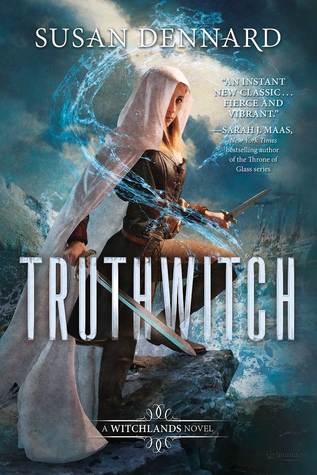 Safi must avoid capture at all costs as she’s a rare Truthwitch, able to discern truth from lies. Many would kill for her magic, so Safi must keep it hidden – lest she be used in the struggle between empires. And Iseult’s true powers are hidden even from herself.
Safi must avoid capture at all costs as she’s a rare Truthwitch, able to discern truth from lies. Many would kill for her magic, so Safi must keep it hidden – lest she be used in the struggle between empires. And Iseult’s true powers are hidden even from herself.
In a chance encounter at Court, Safi meets Prince Merik and makes him a reluctant ally. However, his help may not slow down the Bloodwitch now hot on the girls’ heels. All Safi and Iseult want is their freedom, but danger lies ahead. With war coming, treaties breaking and a magical contagion sweeping the land, the friends will have to fight emperors and mercenaries alike. For some will stop at nothing to get their hands on a Truthwitch.
So Kate Elliott was talking this up on Twitter a while back, and as the old saying goes, As goes Kate Elliott, so goes my heart. Also, never doubt Kate Elliott, because this book was delightful. Fundamentally, this is a book about a friendship between two young women. And they’re having adventures and there’s the possibility of a fulfillment of prophesy, plus some solid flirting with handsome young beefcakes, and don’t forget imperial politics, but mostly it’s about their friendship. Which is lovely.
Also in its favor? Probably the most body-positive “young woman puts on amazing ballgown and admires herself” scene that I have ever had the privilege to read, plus a really great surprise with how Dennard handles a character who could’ve easily been the evil Terminator character of the series, but is clearly brewing to be something much more complex and fascinating. I definitely can’t wait for the sequel, though judging from Goodreads I’ll at least have to wait a year. Sigh.
2. The Serpent of Venice by Christopher Moore
New York Times bestselling author Christopher Moore channels William Shakespeare and Edgar Allan Poe in this satiric Venetian gothic that brings back the Pocket of Dog Snogging, the eponymous hero of Fool, along with his sidekick, Drool, and pet monkey, Jeff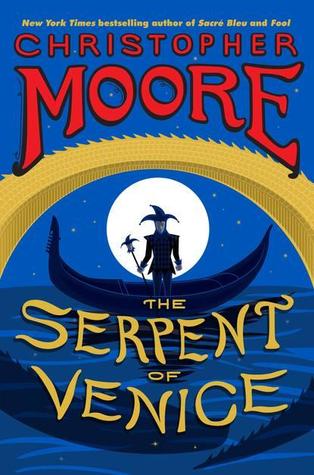
Venice, a long time ago. Three prominent Venetians await their most loathsome and foul dinner guest, the erstwhile envoy of Britain and France, and widower of the murdered Queen Cordelia: the rascal-Fool Pocket.
This trio of cunning plotters-the merchant, Antonio; the senator, Montressor Brabantio; and the naval officer, Iago-have lured Pocket to a dark dungeon, promising an evening of sprits and debauchery with a rare Amontillado sherry and Brabantio’s beautiful daughter, Portia.
But their invitation is, of course, bogus. The wine is drugged. The girl isn’t even in the city limits. Desperate to rid themselves once and for all of the man who has consistently foiled their grand quest for power and wealth, they have lured him to his death. (How can such a small man, be such a huge obstacle?). But this Fool is no fool . . . and he’s got more than a few tricks (and hand gestures) up his sleeve.
So many foul jokes, so many Shakespeare in-jokes, really, what’s not to like? An excellent sequel to Fool.
3. Fortune’s Pawn by Rachel Bach
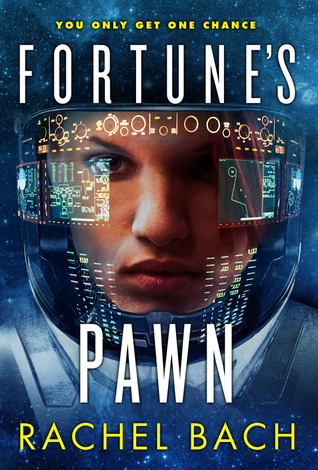 Devi Morris isn’t your average mercenary. She has plans. Big ones. And a ton of ambition. It’s a combination that’s going to get her killed one day – but not just yet.
Devi Morris isn’t your average mercenary. She has plans. Big ones. And a ton of ambition. It’s a combination that’s going to get her killed one day – but not just yet.
That is, until she just gets a job on a tiny trade ship with a nasty reputation for surprises. The Glorious Fool isn’t misnamed: it likes to get into trouble, so much so that one year of security work under its captain is equal to five years everywhere else. With odds like that, Devi knows she’s found the perfect way to get the jump on the next part of her Plan. But the Fool doesn’t give up its secrets without a fight, and one year on this ship might be more than even Devi can handle.
Oh my god, Devi kicks all the ass in the world. I love that she’s take-no-shit, I love that she has ambition and she’s not afraid to show it, I love that she is completely unashamed of her sexuality, I love that she has power armor with two guns and a sword AND SHE HAS NAMED ALL OF THEM, and I basically love everything about this book. I really only meant to read a few chapters, but instead I read the whole thing. I also read the sequel (Honor’s Knight), which I’m not including on this list only because it would read like an almost identical fan letter to Bach. But it was also fabulous, and I’m looking forward to the third in the series, which now sits upon my to-read shelf.
4. The Magician’s Land by Lev Grossman
Quentin Coldwater has been cast out of Fillory, the secret magical land of his childhood dreams. With nothing left to lose, he returns to where his story began, the Brakebills 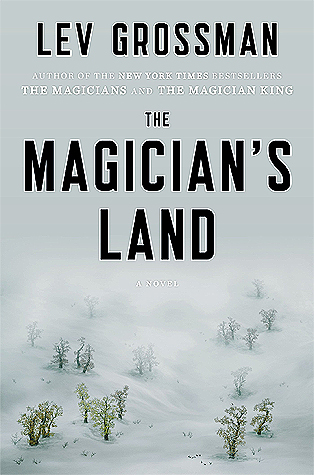 Preparatory College of Magic, but he can’t hide from his past, and it’s not long before it comes looking for him.
Preparatory College of Magic, but he can’t hide from his past, and it’s not long before it comes looking for him.
Along with Plum, a brilliant young undergraduate with a dark secret of her own, Quentin sets out on a crooked path through a magical demimonde of gray magic and desperate characters. But all roads lead back to Fillory, and his new life takes him to old haunts, like Antarctica, and to buried secrets and old friends he thought were lost forever. He uncovers the key to a sorcery masterwork, a spell that could create magical utopia, and a new Fillory–but casting it will set in motion a chain of events that will bring Earth and Fillory crashing together. To save them he will have to risk sacrificing everything.
What a lovely, lovely conclusion to the trilogy. It has all the gorgeous imagery and writing, plus sly humor and characterization, that I loved about the first two, but it’s a different book. This is a book about Quentin finally becoming an adult, and as a result the book itself is much more tightly plotted. A lot of subtle stuff, plus some amazing and grand moments. Also, bacon. Perfection.
5. Ethan of Athos by Lois McMaster Bujold
The familiar old SF “planet of women” chestnut is reversed in the planet of Athos — an 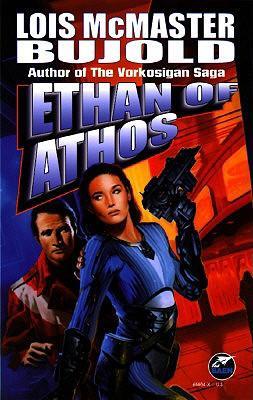 all-male planet made possible by the invention of the uterine replicator. Ethan, drawn out of his beloved Athos by a quest, finds himself an alien in more mainstream human society, and cannot help but find women disturbing aliens as well, especially the ultra-competent, ultra-beautiful Elli.
all-male planet made possible by the invention of the uterine replicator. Ethan, drawn out of his beloved Athos by a quest, finds himself an alien in more mainstream human society, and cannot help but find women disturbing aliens as well, especially the ultra-competent, ultra-beautiful Elli.
Ethan of Athos is Lois McMaster Bujold’s third novel. It departs from the concerns of the Vorkosigan family to explore the ramifications of advanced biotechnology, turning many a cliché on its head along the way.
This was a hugely fun book to read, because in so many ways it is so classic SF, but in other ways it is strikingly modern. Ethan is an obstetrician from a planet made up entirely of men, but when the planet’s supply of ovarian tissue (critical to their ability to grow their sons in uterine replicators) begins dying (it is still the original tissue from 200 years ago, the planet’s founding), Ethan has to go on a mission to get more for his planet. In doing so, he is suddenly exposed to women, as well as an entirely different society. Along the way he gets sucked into what is essentially a noir murder mystery, teamed up with a beautiful, mysterious, and wholly dangerous female mercenary.
So here’s what I really loved about this book – the whole time, I’m just waiting, WAITING, for the moment that Ethan was going to discover that he really liked women, and the power of the male-female missionary position was going to make him swear off his planet, or swear to expose his planet to women or some such thing. But that doesn’t happen. Ethan learns that women are people, that they aren’t inherently sinful, and he becomes real friends with Elli (the mercenary), but he is still who he is – a man who is sexually attracted only to men. A nice man who just wants to go home to his planet and his family and start having sons of his own. I was so pleasantly surprised by Bujold allowing Ethan to stay Ethan, and it actually comes out as a fairly subversive book. Loved it.
6. Missoula: Rape and the Justice System in a College Town by Jon Krakauer
Missoula, Montana is a typical college town, home to a highly regarded state university whose beloved football team inspires a passionately loyal fan base. Between January 2008 and May 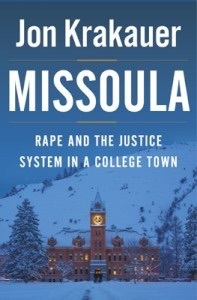 2012, hundreds of students reported sexual assaults to the local police. Few of the cases were properly handled by either the university or local authorities. In this, Missoula is also typical.
2012, hundreds of students reported sexual assaults to the local police. Few of the cases were properly handled by either the university or local authorities. In this, Missoula is also typical.
In these pages, acclaimed journalist Jon Krakauer investigates a spate of campus rapes that occurred in Missoula over a four-year period. Taking the town as a case study for a crime that is sadly prevalent throughout the nation, Krakauer documents the experiences of five victims: their fear and self-doubt in the aftermath; the skepticism directed at them by police, prosecutors, and the public; their bravery in pushing forward and what it cost them. These stories cut through abstract ideological debate about acquaintance rape to demonstrate that it does not happen because women are sending mixed signals or seeking attention. They are victims of a terrible crime, deserving of fairness from our justice system. Rigorously researched, rendered in incisive prose, Missoula stands as an essential call to action.
This book was emotionally hard to read because of its subject matter, but I feel that it is profoundly important for the way that it focuses on acquaintance rape and the profound way that our current handling of rape in the justice system is failing so many women in our country.
7. The Hemingses of Monticello by Annette Gordon-Reed
In the mid-1700s the English captain of a trading ship that made runs between England and the Virginia colony fathered a child by an enslaved woman living near Williamsburg. The woman, whose name is unknown and who is believed to have been born in Africa, was owned by the Eppeses, a prominent Virginia family. The captain, whose surname was Hemings, and the woman had a daughter. They named her Elizabeth.
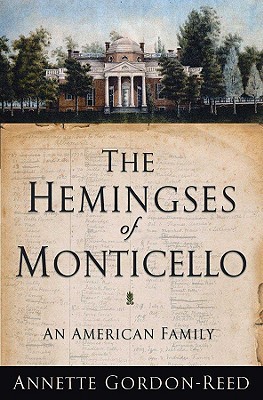 So begins this epic work—named a best book of the year by the Washington Post, Time, the Los Angeles Times, Amazon.com, the San Francisco Chronicle, and a notable book by the New York Times—Annette Gordon-Reed’s “riveting history” of the Hemings family, whose story comes to vivid life in this brilliantly researched and deeply moving work. Gordon-Reed, author of the highly acclaimed historiography Thomas Jefferson and Sally Hemings: An American Controversy, unearths startling new information about the Hemingses, Jefferson, and his white family. Although the book presents the most detailed and richly drawn portrait ever written of Sarah Hemings, better known by her nickname Sally, who bore seven children by Jefferson over the course of their thirty-eight-year liaison, The Hemingses of Monticello tells more than the story of her life with Jefferson and their children. The Hemingses as a whole take their rightful place in the narrative of the family’s extraordinary engagement with one of history’s most important figures.
So begins this epic work—named a best book of the year by the Washington Post, Time, the Los Angeles Times, Amazon.com, the San Francisco Chronicle, and a notable book by the New York Times—Annette Gordon-Reed’s “riveting history” of the Hemings family, whose story comes to vivid life in this brilliantly researched and deeply moving work. Gordon-Reed, author of the highly acclaimed historiography Thomas Jefferson and Sally Hemings: An American Controversy, unearths startling new information about the Hemingses, Jefferson, and his white family. Although the book presents the most detailed and richly drawn portrait ever written of Sarah Hemings, better known by her nickname Sally, who bore seven children by Jefferson over the course of their thirty-eight-year liaison, The Hemingses of Monticello tells more than the story of her life with Jefferson and their children. The Hemingses as a whole take their rightful place in the narrative of the family’s extraordinary engagement with one of history’s most important figures.
Not only do we meet Elizabeth Hemings—the family matriarch and mother to twelve children, six by John Wayles, a poor English immigrant who rose to great wealth in the Virginia colony—but we follow the Hemings family as they become the property of Jefferson through his marriage to Martha Wayles. The Hemings-Wayles children, siblings to Martha, played pivotal roles in the life at Jefferson’s estate.
We follow the Hemingses to Paris, where James Hemings trained as a chef in one of the most prestigious kitchens in France and where Sally arrived as a fourteen-year-old chaperone for Jefferson’s daughter Polly; to Philadelphia, where James Hemings acted as the major domo to the newly appointed secretary of state; to Charlottesville, where Mary Hemings lived with her partner, a prosperous white merchant who left her and their children a home and property; to Richmond, where Robert Hemings engineered a plan for his freedom; and finally to Monticello, that iconic home on the mountain, from where most of Jefferson’s slaves, many of them Hemings family members, were sold at auction six months after his death in 1826.
As The Hemingses of Monticello makes vividly clear, Monticello can no longer be known only as the home of a remarkable American leader, the author of the Declaration of Independence; nor can the story of the Hemingses, whose close blood ties to our third president have been expunged from history until very recently, be left out of the telling of America’s story. With its empathetic and insightful consideration of human beings acting in almost unimaginably difficult and complicated family circumstances, The Hemingses of Monticello is history as great literature. It is a remarkable achievement.
Incredibly nuanced and detailed. Gordon-Reed is unafraid of looking at all the interpretations and permutations of the incredibly complex and fundamentally challenging relationships that arose between the Hemingses and the family members who owned them. The research here and the care taken to analyze it also allows the modern reader to look behind the veil of what was commonly said in public in society, and how lives were lived in private. An amazing work of history.








































